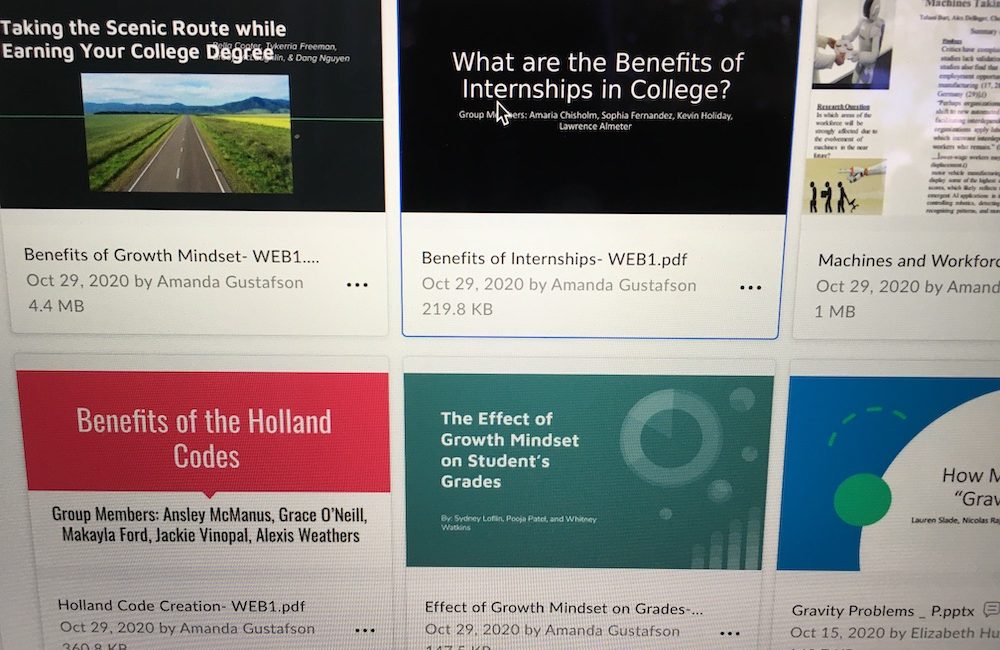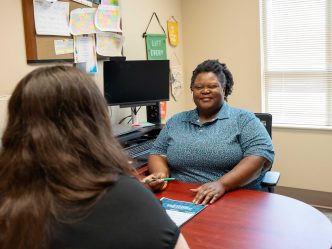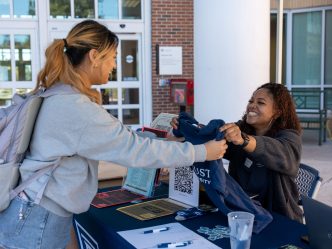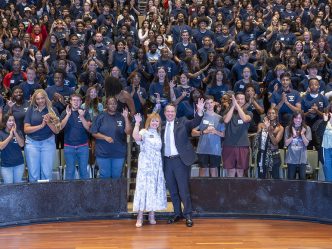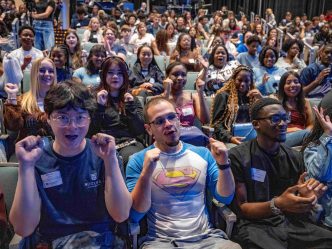Like so much this year, undergraduate research took on a completely different approach this fall in the INQR 1000 Expo due to the COVID-19 pandemic.
INQR 1000 is a 10-week course designed to introduce new college students to the value of research and presentations. Typically, the class is a one-credit hour, small group, discussion-based course designed to engage freshman and sophomore students in the discovery, exploration and analysis of ideas that faculty members, across a variety of disciplines, study and navigate.
But with the realities of the COVID-19 pandemic this year, Augusta University’s Office of First and Second Year Experiences had to think outside the box for the INQR 1000 Expo’s student research presentations this fall.
Instead of having in-person presentations as in previous years, the INQR 1000 Expo presentations were submitted online and reviewed by faculty and fellow students who were allowed to post comments to each individual presentation. Approximately 500 undergraduate students are enrolled in INQR 1000 each semester.
“INQR 1000 is a core class for first and second-year students. It’s a one-credit, one-hour class that consists of traditional classes and design-your-life classes,” said Dr. Elizabeth Huggins, the director of First and Second Year Experiences at Augusta University. “The traditional classes are taught by faculty who want to explain or dive deeper into research within their discipline. In those cases, students get a chance to really think about majors, such as sociology or history or psychology, in a way that allows them to look at journal articles and do some research in those fields.”

The other option of design-your-life courses are created for students who are still searching for a major or those who might have a change of heart in their initial chosen major, Huggins said.
“Those courses are for students who have taken a couple of classes and realized that their intended major is not for them. Suddenly they ask, ‘What am I going to do now?’” she said. “But in general, it’s really good for first- and second-year students to have some foresight, to think through what they might want to be doing in college and beyond.”
By the time a student is a sophomore or junior in college, Huggins said it’s important for them to focus on a specific major.
“Students have just a few semesters to make an impact and put tools in their toolbox to make them attractive to either an employer or a graduate school,” she said. “So, freshmen students need to think about what they might want to get involved in over the next five semesters that will help them stand out.”
Due to the COVID-19 pandemic, students were allowed to review each other’s presentations online via the cloud content management service, Box, and provide helpful suggestions to their classmates, Huggins said.
“Most semesters, we do these face-to-face presentations in the ballroom of the Jaguar Student Activities Center,” Huggins said. “Students create posters that describe their research process and findings. Then faculty with clipboards walk around and ask, “What was your research question? What did you find?” And the students have to defend it.”
But Augusta University didn’t want to risk having hundreds of students and faculty congregating in the ballroom during the pandemic.
“So, we decided to have it all online,” Huggins said, acknowledging she was not thrilled with the idea at first. “But I have to say, I’m starting to change my opinion and consider the fact that maybe the expo should be online because it gives people the time to be able to really review the research. Whereas, a one-hour festival in the JSAC ballroom is fun and engaging, but it doesn’t give people the time to really dive deeper into the questions.”
Huggins said she was impressed by how many students openly participated in the comment section of the online presentations.
“While this was a new approach this year, I think what we do each year is to encourage the students to ‘learn by doing,’ which is reflective of our university’s quality enhancement plan. After all, it’s their project,” Huggins said. “They created it, they defend it and they own it. It’s very much, project-based learning.”
The faculty at Augusta University also benefit from participating in the 10-week course, Huggins said.
“Faculty members who teach INQR 1000 will receive $1,000 in professional development per course with a max of $2,000 per year,” she said. “These funds will be available the following academic year and are intended for research and scholarly support.”
The participating faculty utilizes a curriculum template outlining five content modules during the 10-week course. Faculty members also mentor student teams as the students develop a presentation focused on course content. Instructors will also participate in a faculty-learning community to explore the content, Huggins said.
Those faculty members who are interested in the program must complete a proposal form to teach an INQR 1000 course for the fall 2021 or spring 2022 semesters. The proposal form will be open until Friday, Nov. 13. Faculty members must obtain signatures from the chair of their department and dean of the college to participate.
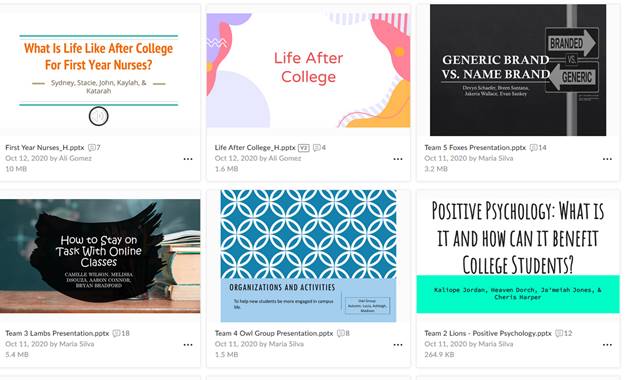
There are several benefits of teaching the INQR 1000 course. Professors can use it as a low-stakes opportunity to test an innovative teaching pedagogy and they can share current research focus or a personal passion with students.
Professors can also use the course as a possible recruiting tool for their department or the course can serve as a type of “lab” for new teaching pedagogy or materials within the discipline, Huggins said.
“Since 2014, we’ve had 97 faculty members from all different disciplines teaching this course,” Huggins said. “So that synergy is great because we’ve got some faculty who have never met before, making and creating and discussing how to make this course even better, which I really love.”
Dr. Lorraine Evans, executive director for the Center for Academic Success at Augusta University, said INQR 1000 typically has some online sections each semester, but this was the first time that all of the projects were presented online for the expo.
“I think what was interesting about it for the students and faculty is, it’s not until you go to the file on Box and see all of the multicolored pictures of the PowerPoints that you’re like, ‘Wow, this is really cool,’” Evans said. “And, honestly, we’re learning as much as the students in this situation. Due to the pandemic, there are some changes that we do because we know it’s the best practice and it’s safe, but we don’t really realize how great it is going to be until we do it. This was one of the positive changes because it worked out better than we thought it was going to.”
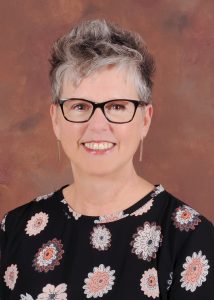
In fact, Augusta University is considering keeping the expo online in the future, she said.
“I think moving forward, this is something that we would think about doing every year because the students got so much out of it and the faculty did as well,” she said. “It is important to teach students about research and how research is different in many fields, but also how to present research because making a PowerPoint presentation is an important tool across all disciplines. And I think that because students were allowed to be creative as they were developing these PowerPoints, it showed them what they can do for their future classes as well.”
Evans was also pleased to see how many students engaged in the discussions about each of the presentations.
“Students can learn from other students because they will look at other people’s presentations and say, ‘Oh wow, that group did that. Well, we did this,’” she said. “And they will develop ideas about what to do and what not to do in the future, so I think it’s a useful tool for students, both long-term as well as short short-term.”
First- and second-year students are also given a boost by their fellow students and faculty members who offer positive comments on their presentations, Evans said.
“Students realize that other people appreciate their efforts in a way that when they are usually working in a class, they don’t necessarily get that positive feedback,” Evans said. “When a student does something and they get outside feedback and their peers are paying attention to what they’re saying, I think it not only motivates students, but it encourages them and gives them more confidence moving forward. They realize that what they’re doing has an impact.”
For more information about INQR 1000, please contact Dr. Elizabeth Huggins at 706-737-1594 or ehuggins@augusta.ed. Faculty interested in applying to teach an INQR 1000 course for the fall 2021 or spring 2022 semesters can visit the First and Second Year Experiences’ INQR 1000 application webpage.
 Augusta University
Augusta University
